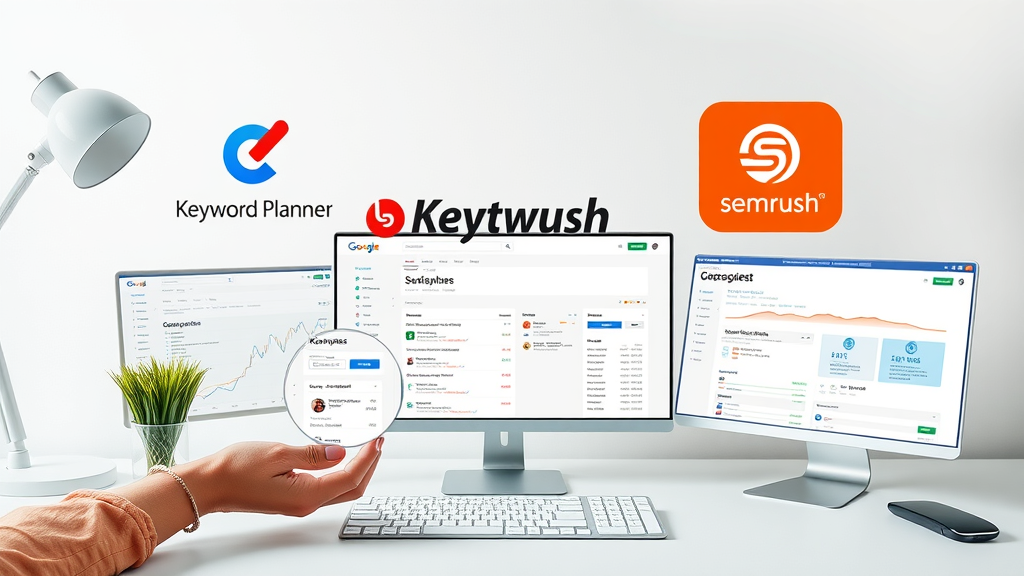Did you know that 92% of content never gets any organic traffic from Google? The culprit? Poor keyword research. It’s a silent killer that undermines your rankings, saps your traffic, and wastes your marketing efforts. But here’s the good news: you can reclaim your SEO momentum starting right now. In this guide, you’ll discover the biggest keyword research pitfalls sabotaging your rankings—and exactly how to fix them to unlock unstoppable growth for your site.
Are You Making These Keyword Research Mistakes?
- Did you know that 92% of content never gets any organic traffic from Google—and poor keyword research is often the culprit? In this article, we’ll explore the most damaging keyword research mistakes, how they quietly erode your rankings, and what you can do to regain your SEO momentum.

Why Accurate Keyword Research Is Critical for Search Engine Success
The Role of Keyword Research in Modern SEO
Keyword research isn’t just a box to check—it’s the cornerstone of modern SEO. The terms you choose influence search engine results, the quality of your audience, and your brand’s digital growth. Without accurate keyword selection, even the best content will vanish into the noise, never reaching the right eyes.
Using a strategic approach with a solid research tool or keyword tool helps you understand how people are searching and what the competition is doing. This empowers you to build a smart keyword plan that aligns with actual interest and search demand. Every successful website rises on the back of sound keyword research—miss this, and no amount of content marketing or paid ads will save your rankings.
Today’s search engines continuously evolve to solve user intent, and so must your strategy. Relying only on assumptions or outdated tactics can render your hard work invisible. Fortunately, by leveraging both free and paid keyword research tools , you’ll outpace competitors who are making costly mistakes, allowing your content to rise to the top.
How Search Volume, Keyword Ideas, and Search Tool Data Guide Content Marketing
Understanding search volume is crucial when picking winning keywords. High search volumes can signal opportunity, but low competition and intent alignment often matter more for ranking. With the right keyword tool , you can uncover untapped keyword ideas that may have less volume but higher conversion potential.
Today’s top research tools —such as Google Keyword Planner, Ahrefs, and SEMrush—offer databases packed with keyword suggestions , real-time search tool metrics, and competitive insights. These allow marketers to refine content marketing efforts by targeting both high-value search terms and relevant long-tail keywords, boosting both visibility and ROI.
By integrating the data from various tools, you can identify related keywords and track changes in user search behavior. This ensures that your content remains current, engaging, and competitive in continuously shifting search engine landscapes.

What You'll Gain from Mastering Keyword Research
- Understand how to avoid costly keyword research mistakes
- Learn how to use search tools effectively for ultra-targeted keyword planner strategies
- Gain insights into boosting rankings and relevant keyword selection
- Discover tools—both free keyword research tool and paid solutions—for maximum ROI
Common Keyword Research Mistakes That Sabotage Your Google Rankings
Ignoring Search Volume and Search Volumes Data
One of the most common keyword research mistakes is neglecting search volume and up-to-date search volumes data. It’s tempting to choose keyword ideas based on what seems logical or popular within your industry. But failing to validate these ideas with real monthly search volume leaves you guessing—and guessing leads to wasted effort. Often, marketers overlook low-volume yet highly-targeted phrases that can drive qualified traffic with less competition.
High search volume keywords can be attractive but may be overly competitive or fail to match your prospect's search intent. Successful brands use a blend of high- and low-volume metrics—via a robust keyword research tool —to create a balanced, effective keyword list . Consistently refreshing your analysis ensures your content marketing remains visible to those searching right now, not just in the past.
Ultimately, regularly consulting your preferred research tool or search tool helps you prioritize keyword search phrases that are both relevant and winnable, fueling higher rankings and better conversion rates.
Overusing Free Keyword Research Tools Without Validation
While a free keyword research tool is often the first stop for many marketers, relying solely on these resources is risky. Free tools like Google Keyword Planner and Ubersuggest provide useful keyword suggestions , but their data can be generalized or limited. Without validation from multiple research tools , you risk targeting keywords that lack real-world traction or suffer from inaccurate competition analysis.
The best practice is to compare data from free and paid keyword research tools . For instance, a keyword plan built with only free statistics may miss out on advanced metrics like difficulty score and monthly search volume breakdowns. Expand your research by cross-referencing findings from several top platforms to ensure you are targeting opportunities that drive results—not just appearing popular in one search tool .
This approach ensures you develop a nuanced and actionable keyword plan , based on comprehensive, validated data.
Misunderstanding Intent in Google Search and Search Engines
A keyword isn’t valuable unless it matches the purpose behind a user’s Google Search or their query on other search engines . Too often, marketers focus on high-traffic terms without considering user intent . This leads to irrelevant traffic, low engagement, and poor conversion.
Your search term selection must distinguish between navigational, informational, and transactional queries. Matching your content to intent means you address what users actually want—whether it’s learning something new or making a purchase. High-ranking pages in 2024 win by targeting intent, verified with data and continually improved with the help of research tool insights.
Whenever you brainstorm keyword ideas , validate them by running test searches and analyzing the top results. Tools like SEMrush or Ahrefs can dissect ranking pages, making sure your strategy centers around aligned, relevant intent.

Relying Exclusively on Google Ads or Google Keyword Planner Data
Many marketers rely exclusively on Google Ads or Google Keyword Planner for their keyword research tool insights. However, these tools are primarily designed for pay-per-click (PPC) campaigns, not organic SEO. While their data is helpful, it can lack the nuance required for comprehensive content marketing strategies.
If you use only Google Ad related tools, you may miss out on nuanced analysis like organic keyword difficulty, competitive gap insights, or trending search term shifts. Integrating results from other research platforms—such as Ahrefs, Moz, or SEMrush—enables a broader perspective to build a strategic, future-proof keyword plan .
Always cross-reference data between multiple research tools to avoid common traps and to ensure your keyword research identifies the best opportunities for organic growth.
Neglecting Related Keyword and Relevant Keyword Opportunities
Focusing solely on your main topic and ignoring related keywords or relevant keyword options is a classic mistake. The Google algorithm and modern search engines reward context-rich content that satisfies tangential interests around your central theme. Missing out on these related terms diminishes your site’s authority and reduces your ranking potential.
Use your keyword tool to discover related keyword clusters and search engine trends. Expanding your keyword list with semantically connected phrases ensures broader visibility for your site and captures visitors who may be searching with variations or long-tail keywords.
- Missing keyword ideas from diverse research tools
- Forgetting about related keywords and search engine trends
How to Choose and Use the Best Keyword Research Tools
Comparing Top Paid and Free Keyword Research Tools
| Tool | Free or Paid | Features | Best For |
|---|---|---|---|
| Google Keyword Planner | Free | Search volume, keyword ideas | Beginners, PPC |
| Ahrefs | Paid | Comprehensive research tool, competition analysis | Advanced SEO |
| Ubersuggest | Freemium | Keyword ideas, search volume | Small business |
| SEMrush | Paid | Competitive analysis, content marketing insights | Agencies |

Maximizing Search Tool and Keyword Tool Features for Better Results
Each major search tool or keyword research tool comes with unique features, from advanced filters to competitive gap analysis. To get the most out of your investment, familiarize yourself with the distinguishing capabilities: Ahrefs excels at backlink analysis, while SEMrush shines in keyword gap and content planning. Google Keyword Planner offers validated search volume for paid and organic, and Ubersuggest combines ease of use with competitive insight at a lower cost.
Don’t stop at basic search volume stats. Examine each keyword’s difficulty score , trends, and performance across SERPs. Use features like keyword clusters, competitor monitoring, and keyword ranking trackers. More advanced platforms let you organize campaigns, automate alerts, and build segmented keyword list strategies for each content area.
Continually test and compare tool results—what works for one target niche may differ for another. The best strategy is dynamic, always driven by deep research tool data and your campaign’s evolving goals.
Utilizing Google Keyword Planner and Google Ads Like a Pro
The Google Keyword Planner provides invaluable research for both paid and organic strategies, especially when paired with insights from Google Ads . Start by entering your primary keyword ideas and review recommended terms, competition levels, and suggested bid prices for paid campaigns.
Use the “Refine keywords” and “Ad group ideas” features to build efficient ad groups and tight keyword clusters for optimizing both your ad spend and your organic campaigns. Investigate seasonal trends, negative keywords, and geographic filtering to maximize your keyword plan and reach the right users.
Remember, top marketers use the Keyword Planner not only for advertisements but also to build multifaceted SEO strategies powered by actionable data, ensuring content gets discovered in both organic search engines and paid placements.
Incorporating Multiple Research Tools for a 360° Keyword Plan
No single keyword research tool tells the full story. Smart marketers pair multiple free keyword research tools with advanced paid solutions to cover every angle of search demand, competition, trends, and audience intent. For instance, you may begin with Google Keyword Planner for baseline ideas, then use SEMrush or Ahrefs for competitive analysis and deeper SERP insights.
The magic happens when you coordinate findings between several research tools —validating search volume , teasing out hard-to-find related keywords , and building a rounded keyword list for every campaign segment. This layered approach is what separates amateur SEO from elite content marketing.
Users who embrace this best practice consistently outperform competitors and keep up with shifting search engines and user preferences, driving sustained organic growth.
Avoiding Outdated Keyword Ideas: Data Best Practices for 2024
How to Interpret Search Volume Trends
Understanding the difference between current and historical search volume is essential. Don’t rely solely on last year’s monthly search statistics—use your keyword research tool to identify recent spikes or steady downtrends in keyword search behavior.
Trends analysis tools let you visualize how keyword ideas perform across weeks, months, or years. Prioritize search tool insights that indicate lasting interest versus fleeting fads. This helps you avoid pouring resources into topics losing relevance, ensuring a more robust and future-proof keyword plan for your business.
Integrate seasonal cycles and industry developments—staying attuned to when your audience is most likely to search for your site’s solutions.

Spotting Shifts in Google Search and Search Engine Behavior
Today’s search engine results can change overnight with algorithm updates. Detecting new or waning interest in certain terms is possible if you closely monitor the search tool and analytics data. Practice continuous discovery: weekly or monthly audits of your keyword list can reveal early signs of behavioral change, letting you rapidly adapt.
Leverage your research tool to set up alerts for sharp drops or sudden surges in search volume . Use Google Trends and similar tools to identify emerging topics and shifts in user intent, giving you a competitive edge over slower-moving competition.
Staying vigilant not only protects your organic traffic but can help you seize timely opportunities before they become mainstream.
Refreshing Your Keyword Plan for Each Campaign
Every new marketing campaign deserves a fresh start—especially your keyword plan . Coordinate your search tool and keyword tool data ahead of each launch to ensure your targeting is up to date and relevant.
Make it a routine to review and update all relevant keyword research on a monthly basis. Analyze previous campaign successes, retire underperforming keyword ideas , and double down on top-converting phrases. This process guards against stale content, keyword cannibalization, and slipping SERP rankings.
- Coordinate search tool and keyword tool data
- Review and update all relevant keyword research monthly
Case Studies: Real Businesses That Fixed Their Keyword Research—and Won Rankings
"After switching from generic keyword tool strategies to tailored research tools, we saw a 300% increase in organic traffic within just 60 days." – SEO Agency CEO
Case Example 1: Leveraging Free Keyword Research Tools Correctly
A small e-commerce store made the shift from random free keyword research tool inputs to a structured, data-driven approach using multiple free keyword research tools like Google Keyword Planner and Ubersuggest. By comparing keyword ideas , analyzing monthly search volumes , and validating terms through Google Search, they narrowed their target to specific, high-intent related keywords .
Within two months, the business saw a 120% increase in organic impressions and a 55% jump in conversions. The biggest difference? Using a cross-validated keyword plan built on fresh, actionable research—rather than chasing what seemed to be “popular” terms via a single search tool .
This case proves that, with diligence and smart validation, free keyword research tools can deliver surprising ROI when used correctly and consistently.
Case Example 2: Integrating a Paid Keyword Research Tool for Pro Results
A B2B SaaS company integrated SEMrush as their primary keyword research tool alongside Google Keyword Planner. With SEMrush’s advanced competition analysis and in-depth keyword clustering, they identified not just volume—but winnable gaps in their niche. Their new keyword plan included both short- and long-tail terms, carefully balanced for buying intent.
The results? In 90 days, organic traffic grew by 180%, and domain authority soared, with dozens of page one rankings for critical business terms. This success highlights the dramatic impact of combining a leading research tool with regular performance reviews and trend-spotting for ongoing SEO relevance.
Whether you’re on a budget or seeking advanced insight, the real win comes from strategic, multi-source research and tactical keyword plan execution.

Step-by-Step Guide to Effective Keyword Research (With Tools)
- Conduct market analysis to identify target audience search engines usage
- Use a mix of paid and free keyword research tools: Google Keyword Planner, Ahrefs, SEMrush, Ubersuggest
- Analyze search volume, trends, and related keywords
- Develop a comprehensive keyword plan for each content cluster
- Continuously monitor performance and adjust strategy with research tools

Learn how to unlock hidden keyword ideas, analyze search volume, and master modern research tools for impactful SEO in our expert video demonstration.
Watch as we explore real-time research using Google Keyword Planner and other free keyword research tools to uncover top ranking opportunities.
Advanced Keyword Research Plan: Integrating Content Marketing
How Content Marketing Ties Into the Keyword Research Process
Content marketing is only as strong as the keyword plan supporting it. By fusing creative storytelling with insight from your keyword research tool , you ensure each post, landing page, or video is built for both users and search engines. The result: stronger authority, more traffic, and a site that grows with your niche instead of lagging behind trends.
A robust plan means mapping keyword ideas to each stage of the funnel—awareness, consideration, conversion—so your content marketing attracts new users and nurtures them until they’re ready to buy. Layer in related keywords and semantically connected topics for maximum reach and engagement.
Don’t just publish—strategically weave in your research tool ’s findings for every piece of content for truly measurable results.

Aligning Keyword Planner Strategies With Search Engine Algorithms
Keyword planner strategies must be dynamic—search engines update algorithms regularly to refine results and satisfy user intent. By staying agile and leveraging your research tool data, you can align your content with these evolving standards.
Keep ahead by monitoring ranking fluctuations, auditing your top-performing and underperforming pages, and feeding insights from your keyword research tools back into your keyword plan . Strategic adaptation keeps your content at the top of SERPs, no matter how Google tweaks its search logic.
A winning SEO strategy is proactive, always anticipating rather than reacting.
Advanced Research Tools for Long-Tail and Related Keywords
Today’s most powerful keyword research tools are perfect for uncovering valuable long-tail and related keywords missed by basic tools. Tools like Ahrefs and SEMrush provide clusters of search terms and real-user search behavior insights.
Use advanced filtering options to surface low-competition, high-intent keywords that align closely with your audience’s needs. Include these in your keyword list and content clusters to outperform competitors stuck on generic search phrases.
The key to modern keyword research? Diversify your sources and let your research tool do the heavy lifting—so every campaign is more profitable.
Avoiding Keyword Cannibalization and Over-Optimization
Identifying and Resolving Keyword Cannibalization Issues
Keyword cannibalization happens when multiple pages on your site target the same keyword ideas —competing against each other rather than helping. Use a research tool or manual audits to map your content and identify overlaps.
Resolve issues by consolidating similar pages, rewriting for different related keywords , or setting canonical tags. Your keyword plan should ensure that every page serves a distinct user intent, maximizing the value of every indexed URL.
Thorough audits and periodic review are essential to keep your site architecture clean and your rankings steadily increasing.
Best Practices to Prevent Over-Optimization in Content Marketing
Over-optimization—cramming your content with search terms or keyword stuffing—is a fast track to ranking penalties. Focus on building natural, valuable content that answers questions, provides clear value, and includes your relevant keyword options judiciously.
Use keyword variations, LSI (latent semantic indexing) terms, and related phrases naturally. Your content marketing must feel human while being data-optimized, so mix primary and secondary keywords in a way that benefits readers first.
Quality always beats quantity in modern search engines . Top SERP positions are earned by informative, well-rounded articles supported—not crowded—by effective keyword research.

Checklist: 10 Things to Verify for Accurate Keyword Research
- Research relevant keywords using a keyword tool
- Document search volume for each keyword search
- Compare data between multiple research tools
- Validate keyword ideas with Google Search and Google Ads
- Check for related keywords in your niche
- Evaluate performance with Google Keyword Planner
- Avoid overlapping keyword plan entries
- Monitor current search engines ranking
- Refresh keyword research tools monthly
- Test both paid and free keyword research tool options
People Also Ask: Answers to Common Keyword Research Questions
What is the most common keyword research mistake?
The most common mistake is choosing keywords solely based on high search volume, without considering user intent or content relevance. This often leads to poor rankings, as pages fail to satisfy what search engines and users want.
How do I find the best free keyword research tool?
Top free keyword research tools include Google Keyword Planner, Ubersuggest, and AnswerThePublic. Combine multiple tools to get comprehensive insights into keyword ideas, trends, and search volumes.
How often should I update my keyword research?
Update your keyword research every 3–6 months or whenever there are significant shifts in search engines, products, or audience behavior to maintain rankings.
What’s the difference between a keyword tool and a research tool?
A keyword tool typically focuses on finding and ranking keywords, while a broader research tool includes competitive analysis, trends, historical data, and related keyword suggestions.
FAQs About Keyword Research, Search Tools, and Content Marketing
Can free keyword research tools compete with paid keyword research tools?
Free keyword research tools offer useful baseline data for getting started, but paid research tools provide advanced features like deeper competitive analysis, SERP tracking, and broader databases. For the best results, combine both approaches to strengthen your keyword research strategy.
How do keyword ideas impact my content marketing success?
Targeted keyword ideas drive your content marketing strategy, ensuring you address what your audience is searching for and boosting your chances of ranking high on search engines. Smart selection and integration of keyword ideas lead to higher engagement and conversions.
What are the critical features of advanced research tools for SEO?
The best research tools for SEO offer features such as SERP analysis, keyword difficulty scoring, competitor tracking, trend forecasting, and clustering of related keywords. These functionalities help marketers build robust keyword plans that win in competitive niches.
How important is search volume in the overall keyword plan?
Search volume is a critical factor in your keyword plan—it shows demand for a term—but should be balanced with keyword difficulty and intent. An effective strategy focuses on achievable, relevant keywords with steady volume and clear business value.
Key Takeaways: Winning the Keyword Research Battle
- Avoid major keyword research mistakes by validating search volume and user intent
- Combine paid and free keyword research tools for the best results
- Integrate research tool findings with your content marketing and keyword planner strategy
- Continuously optimize and refresh your keyword plan for better rankings
Ready to Transform Your Rankings With Smart Keyword Research?
- Reclaim your SEO momentum with bulletproof keyword research strategies. Let's have a chat—call 904-385-5213 to discover how the right keyword research tools and expert insights can elevate your business.
To enhance your understanding of keyword research mistakes and how to avoid them, consider exploring the following resources:
- “7 Keyword Research Mistakes that Sabotage Your SEO Efforts” ( beaconinnovation.org )
This article outlines common pitfalls in keyword research, such as focusing solely on high-volume keywords and neglecting user intent, providing actionable solutions to improve your SEO strategy.
- “6 Common Keyword Research Mistakes” ( improvemysearchranking.com )
This piece discusses errors like ignoring long-tail keywords and failing to analyze competitor strategies, offering insights to refine your keyword research approach.
By reviewing these articles, you’ll gain valuable perspectives on optimizing your keyword research to enhance your website’s search engine rankings.
 Add Row
Add Row  Add
Add 



Write A Comment